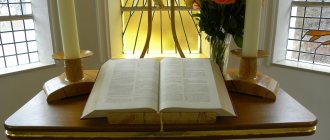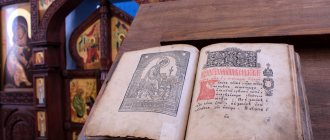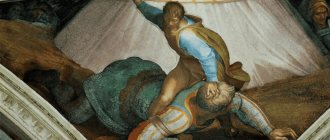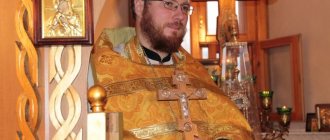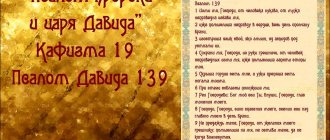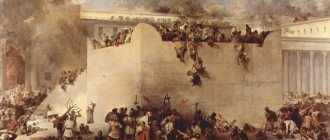This article is about Psalm 11 in Hebrew (Masoretic) numbering. For the numbering of Psalm 11 in Greek (Septuagint or Vulgate), see Psalm 12.
Psalm in the 9th-century Utrecht Psalter, where illustrations of the text are often verbatim.
Psalm 11
is the 11th psalm from the Book of Psalms. In the Septuagint and Vulgate it is numbered Psalm 10. Its authorship is traditionally attributed to King David, but most scholars place its origin some time after the end of the Babylonian captivity. [1]
Why and by whom is Psalm 11 read?
Previously, sacred texts that were of special significance for worship could only be pronounced by clergy. Today, this tradition is a thing of the past, so the psalms have become available for prayer at home. The goal is to understand and accept the injustice that is happening, not to condemn and not to wish for death, but only for deserved punishment for sinners. In this case we are talking about traitors, slanderers, and wicked people.
Psalm 11 can be said to everyone,
who needs help overcoming difficult experiences when treated unfairly by other people.
In this case, it is possible to deviate to one of two extremes: denial of the concept of “injustice” (then the belief in the infallibility of some people is strengthened, while others, on the contrary, are destroyed due to the imperfection of the soul); lack of understanding of where unfair treatment begins and ends (lack of boundaries for the perception of unseemly actions). This is one of the reasons why one should read the Psalm of the first kathisma, which includes the 11th canticle.
Links[edit]
- Morgenstern, Julian. "Psalm 11". Journal of Biblical Literature
, vol. 69, no. 3. 1950, p. 221–231. - ^ ab Hermann Gunkel, Die Psalmen
. volume 6. (Auflage, Vandenhoeck & Ruprecht, Göttingen 1986), p. 40. - Erhard S. Gerstenberger, Psalms.
Part 1 (Ps. 1–60) with an introduction to devotional poetry . (Eerdmans, Grand Rapids, 1988), p.78. - ↑
Hans-Joachim Kraus,
Psalms 1–59.
7. Auflage , (Neukirchener Verlag, Neukirchen-Vluyn 2003), p. 228. - Vgl. Hans-Joachim Kraus, Psalms 1–59.
7. Auflage, (Neukirchener Verlag, Neukirchen-Vluyn 2003), p. 229. - ^ ab Oswald Loretz
,
Psalmstudien. Kolometrie, Strophik und Theologie ausgewählter Psalmen.
(De Gruyter, Berlin, 2002), p. 106 - ↑
Klaus Seibold: Die Psalmen Mohr Siebeck, Tübingen 1996, p 60. - Erhard S. Gerstenberger, Psalms.
Part 1 (Ps. 1–60) with an introduction to devotional poetry . Eerdmans, Grand Rapids, 1988, pp. 78f. - https://biblehub.com/commentaries/barnes/psalms/11.htm
- https://www.biblegateway.com/passage/?search=1%20Samuel+21&version=ESV
- https://www.biblegateway.com/passage/?search=Psalm+7%3A12&version=ESV
- traduction par Prosper Guéranger, Regle de
Saint-
Benoit
, (Abbaye Saint-Pierre de Solesmes, re-impression 2007) p. 46. - The main cycle of liturgical prayer lasts four weeks.
“Psalm of David 11” – history, meaning, interpretation
There is no exact date when the text was written. However, a number of signs suggest that this happened during the period of persecution. At the same time, the prophet fled from Saul. Then he experiences mental anguish. David suffers from betrayal. The ruler's position is aggravated by slander. The wicked who betrayed David also spread unkind, false rumors about him. The Prophet was innocently accused of many sins. He was on the run, and therefore could not clear his name, which oppressed the righteous man twice as much.
It is interesting that there were 2 similar situations: David escaped from Absalom and Saul. In the first case, the culprit was the son of the prophet. He participated in a secret conspiracy, and when he spoke openly, he soon died. Indirect factors indicate that it was from Saul that David fled:
- duration of persecution;
- decline in the moral purity of the people;
- open persecution.
When reading the prayer text, ambiguities may arise, especially if it is written in Church Slavonic. You should know how the words and phrases that make up the verses of Psalm 11 are interpreted:
- The first verse presupposes the acceptance of the fact that there are no faithful and righteous sons of men in those near and far. This means not only those people who organized the coup, but also those who were assistants in this matter, standing a rank higher than the common people. Officials are among the first to “lose face,” their character changes, and vices appear. This has been the case at all times when power was given to people who were not yet ready for such a status.
- The second verse describes the prophet’s environment: he could not rely on those around him, because they either betrayed him or were afraid to provide help for fear of punishment. David was surrounded by false words, which is why he said: “Tying lips speak from a feigned heart.”
- Verse three. Those who slander and show deceit will be destroyed.
- The fourth verse is a continuation of the third. It shows people's confidence in their infallibility. They declare: “Let us magnify our tongue, our lips with us. Who is our master?”, assuming that there is no one above them (God).
- Fifth verse. “Because of the distress of the poor and because of the groaning of the poor, I will now rise.” The words of the Lord give hope for deliverance from defilement, cleansing the souls of the wicked, but only those of them will be forgiven who repent; the rest will receive punishment for self-will.
- Verse six is a reminder that “the words of the Lord are as pure as silver heated with fire, tested in the furnace of the earth.” And let it be as he commands.
- Seventh verse. It talks about the protection of the Lord, he will give protection to the righteous. At the same time, “Our Father will save us from this generation.” He will stop the persecution of believers and protect them from condemning humanity.
- The eighth verse helps us remember that “he has increased the care for the sons of men,” this necessity is due to the fact that “the wicked walk around.” The Lord, in his height, increased the protection of the righteous from persecution by sinners.
Interpretation of the Psalm
In the very text of the psalm, David appeals to his only and constant Defender and Comforter - the Lord God. He prays for salvation in every verse of the psalm:
- Verses 1-2 indicate that during Saul’s persecution, most of the people were hostile to David—all the high dignitaries, those close to the king, and just ordinary citizens. Among them were only “unrighteous”, i.e. undeserved and hostile sentiments towards David. The warrior weakened from the constant and widespread persecution of “no one is righteous, not even one.”
- In verses 3-5, the author says that he has not yet met sympathy for himself or has not accepted help - no one cares about his fate, or people wish him death. Around him, everyone is pretending or is in a hurry to report to the king about his whereabouts. For those close to the king, David was also dangerous, because he was extremely popular among the common people, and this could lead to rebellion, rebellion and the complete overthrow of Saul’s court. Therefore, all officials sought to help the current king destroy his rival, while feeling their impunity.
The Prophet compares the word of the Heavenly Lord to refined silver: it is precious, hard and indestructible - Verses 6-9 directly turn to the Lord for salvation. David says that only in God is salvation, that only the Almighty is the Protector of every righteous person, and only help from above is worth relying on. The promise of God helps David cope with difficulties, because he has hope of salvation and mercy.
Important! Psalm 11 perfectly shows David's true nature - no matter how difficult the circumstances may be, the threat to his life is one thing he stands firmly in - God will protect his righteous.
Full text of the prayer “Psalm 11” in Russian – read online, download for free
Initially, the text was written in a language that is difficult for modern people to understand, especially if they are far from church traditions. The priest can tell you the meaning of the phrases of the eleventh canto. It should be remembered that if you read Psalm 11 of David often, over time you will understand what is written.
When turning to God, you need to take into account that exalting yourself over others gives the opposite result. If a prayer word is read, and the reader of the sacred text thinks of himself as equal to God, but puts himself above the rest, then he himself will suffer punishment. There is such a danger when righteous anger arises at the wicked who betray, slander, and spread rumors. Such feelings can quietly go to the other extreme. For this reason, one must be like God, but not become in his place.
1 To the choir conductor, with an eight-string instrument. Psalm of David.
2 Lord, help, because the saint has disappeared, the faithful among people have disappeared!
3 They deceive one another; Their flattering tongue speaks from a lying heart.
4 May the Lord destroy every flattering tongue and every boastful mouth,
5 that they say: “We will gain victory with our lips. Our language is with us - who is our master?
6 “Because the weak are oppressed and the poor groan, I will now arise,” says the Lord. “I will give them the salvation they desire.”
7 The words of the Lord are pure words, like silver that has been refined in a furnace and refined seven times.
8 Lord, You will keep us, You will keep us from this generation forever.
9 The wicked go about everywhere, when baseness is held in high esteem among men.
Send this prayer to your loved ones
Send this prayer to your loved ones
Send this prayer to your loved ones
Listen to “Psalm 11” - audio version of the message of the prophet David
Prayer in Church Slavonic with emphasis and translation
1 Finally, O osmake, a psalm to David.
(For fulfillment, about the eighth day. Psalm of David.)
2 Save me, Lord, for the saint has become poor, for he has lost the truth from the sons of men.
(Save me, O Lord, for the righteous is no more, for the truth is diminished from the sons of men.)
3 A vain verb, every one to his own sincerity, a flattering verb in the heart, and an evil verb in the heart.
(Each one has spoken vain things to his neighbor; the lips are deceitful in their hearts, and evil has been spoken in their hearts.)
4 The Lord will require all flattering lips and lofty tongues,
(The Lord will destroy all perverse lips and arrogant tongues)
5: Let us magnify our tongue, our lips are ours, who is our Lord?
(those who said: “Let us magnify our tongue, our lips with us, who is our master?”)
6 For the sake of the poor and the groaning of the needy, today I will rise again, says the Lord, I will rely on salvation, I will not be offended about it.
(“For the sake of the distress of the poor and from the groaning of the poor, I will now arise,” says the Lord, “I will reveal salvation in Myself, I will clearly proclaim it!”)
7 The words of the Lord are pure, the silver is kindled, the earth is tempted, the word of the seven is purified.
(The words of the Lord are pure words, silver heated by fire, tested in the furnace of the earth, purified seven times.)
8 You, O Lord, have preserved us and kept us from this generation and forever.
(You, Lord, will preserve us and save us from this generation forever.)
9 Around wickedness walk, the sons of men have multiplied according to your height.
(The wicked walk around; according to Your height You have increased your care for the sons of men.)
Send this prayer to your loved ones
We read the Psalter. Psalm 11
Audio |
Conversation with Archpriest Alexy Ladygin about the Psalter.
Those unrest, those untruths that existed in ancient times, still exist today... What is “To the end, O Osme”? We are talking about the final eighth day. All life happens in seven days. In six days of labor, the Lord gave an image of our labors, our cultivation of the land, and on the seventh day he rested and commanded us that on this day we should give up various labors and replenish our spiritual and physical strength. On the eighth day, the incredible happened - the Lord rose again. And when He came to earth, He changed it, drew a certain line under human life. If we take a certain stage of life on earth, then the 8th day is the final day, the day of the Last Judgment, when the Lord will draw a line under the life of everyone living on earth and give him an assessment. On the last day, humanity will receive Judgment, and it will be final, it will be the completion of all our works, deeds, thoughts. Some kind of assessment will be received: we must remember that there will be this 8th day, that the Lord will definitely give us an assessment; He returns a person to the truth in which he must live.
In prayer, a person either praises the Lord in joy, or, being in spiritual turmoil, speaks about his sad state, which does not give him peace. The psalmist David experienced different stages of life. They were very difficult, internally burdened... This psalm is dedicated to the events at the beginning of David’s earthly journey, when he competed with Saul and Saul did not accept God’s anointed. Saul did not accept the will of God about David, that his kingdom ended, since he did not fulfill God’s promise. At this time, David was in shock: many betrayed him, many slandered him, he was told one thing, and Saul – another. And David was in a very difficult condition.
This psalm is different in that David, not yet feeling sin, communicates with God without asking Him for mercy. He asks the Lord to create the truth, presenting to the Lord the truth that the Lord revealed to him and which he, David, accepted and followed.
The psalm begins with these amazing words: “Save me, O Lord, for I have become impoverished, for the truth has fallen away from the sons of men”; the truth of God no longer lives in the hearts of people, there are very few holy people (“venerable” is one who lives in the truth of God, who is like God Himself in good deeds and strives to fulfill the commandments of God). The time comes when holiness becomes impoverished. Holiness is the foundation of life on earth. Our ancestors said so: a city without a saint and a village without a righteous man cannot stand. Righteousness from what? Because righteous deeds are done - God's ones: a person strives for God, for a virtuous life, and therefore joins in holiness.
If a person does not join in holiness, then the meaning of life on earth is lost. Then villages are wiped off the face of the earth and cities are destroyed. Not by the force of economic factors, but by the force of the loss of holiness: there is nothing that holds life in this place, but only holiness, the thread that connects man with God, earth with Heaven. Then the land becomes fertile... If holiness is lost, then everything is destroyed. Therefore, “the venerable one is poor,” writes the psalmist David. Due to what? The Holy Fathers explain: due to the fact that the former saints have gone into eternal life, and there are fewer and fewer new saints. It is not that no one strives for holiness; holiness becomes unclaimed in our lives: it is difficult to do good if good is not in demand, if it is not accepted, people begin to laugh at it. We know how today the laws of God are ridiculed - holiness, chastity, purity of relationships. If you are not like everyone else, the world will not accept you. Why have our children recently begun to be seduced and move towards this world? Not because they want to commit sin, but because they do not want to stand out in this world. They want to be like everyone else so that the world does not reject them. And this is where evil lies, because due to such actions, holiness in our lives becomes impoverished. Even in those days, the psalmist David complains that sin predominates in human relationships, that holiness leaves man - “as truth has fallen away from the sons of men.” What does this mean? There is truth in this life, without it it is impossible, but there is very little of it.
“Vainous verbs to each one’s sincere, flattering lips.” Vanity is not fundamental, not what a person really needs. A person lives in untruth, speaks all kinds of lies: “a flattering mouth is in the heart, and evil words are in the heart”; he may even say some good words, but they are false. He says one thing and thinks something else, he plans evil things, but does not voice them, and he begins to do this, but, while calming the other, he tells a lie.
The psalmist David is a prophet. He prophesies that it will be the same with Christ: untruth, slander, evil plans in the heart - all this was against our Lord Jesus Christ, and this untruth reigns to this day. Where there is no God, there is no Light, there is no Christ; there is untruth there. People say one thing, think another, do something else - “evil in their hearts.”
“The Lord will consume all flattering lips and lofty tongues.” The Lord, of course, will destroy all untruth, abolish it only when He ascends after His suffering, when He reveals the truth on this earth. We must remember: no matter what human language is, no matter how unrighteously it speaks, the truth of God will still triumph on earth.
“Rekshya: let us magnify our tongue, our lips are our essence, who is the Lord to us?” It is said: “We are free people, we have our own language, who can stop us from saying what we want? Where is your Lord? He won’t do anything to us.” The Holy Fathers cite the example of Nebuchadnezzar, Pharaoh. When they boasted of their power and glory and said to righteous people (including the Jewish people, who were the guardians of Divine truth on earth): “Where is your God?” and laughed at God, they did not remain without punishment. It is known from the Holy Scriptures that the Lord necessarily punished any madness that was started against the people of God.
And in our lives the question was asked, “Where is your God?” when they destroyed the churches of God, burned icons, removed crosses from churches, destroyed holy people of God, monastics, clergy, bishops, and simply believers. Those who committed this untruth, this sin, were punished, and their generations were punished, and they brought down curses on themselves from Heaven: God cannot be mocked. Anyone who says “Where is your God?” thereby invites the wrath of God upon himself.
The Psalter teaches us to be careful with our words, especially not to violate the 3rd commandment of the Law of God: do not take the name of the Lord your God in vain. Many unbelieving people are proud of their position, money and say “where is your God?”, and then punishment comes to them, to their family, to their children, to their loved ones. So we must be very careful with the words we speak.
If we do not believe in God, this does not mean that He does not exist. Metropolitan Veniamin (Fedchenkov) talks about this well. This attitude towards God and the Holy Scriptures existed even in the environment where future shepherds were raised. One student asks another while standing in line at the cafeteria: “Do you believe in God?” He says: “Have you seen Him?” But if you have not seen Him, this does not mean that He does not exist. And an uneducated watchman stands next to him and says: “Have you seen my grandmother?” - “No, I didn’t see it.” - “And she still lives to this day.” As you can see, it is better to always have prudence and restraint in speech.
“For the sake of the poor and the sighing of the needy, I will now rise again, says the Lord, I will rely on salvation, I will not complain about it.” Amazing messianic place! Why does the Lord come to earth? For the sake of the poor and the sighing of the poor. A beggar is someone who was once rich and has become poor. The poor person is constantly in poverty, and they laugh at him, they do not listen to his word, although he may be a wise man, the Lord may bestow upon him special gifts. Why does the psalmist David use them as an example? He wants to show in what dire condition the beggar and the wretched are; not so much in a physical, but in a spiritual state in relation to the Lord. He comes to earth for the sake of those about whom he says in the Holy Scriptures: “Blessed are the poor in spirit.” The Lord will even go to a shameful death to save such people.
“The word of the Lord is pure, silver is kindled, the earth is tempted, purified by the sevenfold.” Very important words: what does the psalmist David say about the words of God? The Word of God is Holy Scripture, what the Lord proclaims to man about what is necessary for his salvation. This is the path of spiritual life, spiritual ascent, improvement, acquisition of the Kingdom of Heaven. These words are without the dirt that can cling to a word or writing. “The word of the Lord is pure, the silver is kindled”: silver passed through fire, purified from all impurities seven times (among the Jews “septenary” - “many times”). This is the purest silver.
“You, Lord, have preserved us and kept us from this generation and forever.” The psalmist David has no one else to trust in in this life. The Lord can protect a person from the untruth that is happening at this time. These are prophetic words. Salvation was revealed by the Divine Savior Himself precisely when He appeared on this earth. The Church of God, the Church of Christ is preserved by the Lord to this day. The enemy of the human race initiated persecution of the Church through various heresies and internal schisms. The Lord preserved her “from this generation and forever.”
“Around wickedness walk, you have multiplied the sons of men according to Your height.” Here the psalmist David says both about himself and about the Church of God that there is a lot of untruth around. Lies, evil, temptation, testing come from different sides, and only the Lord can protect you from untruth. Including the untruths that David encountered in his rivalry with Saul. But David always believed that the Lord would not leave him. He says: Lord, I feel Your truth, and Your words are true, and they cannot fail to be fulfilled in this life; You test us, but I tell You that You will save me, You put me in this place; it means you won't leave me.
Such bold prayer is contained in this psalm by the psalmist David. He says: he who commits unrighteousness will receive judgment at the end of his life.
Psalm of David 11 in the Synodal translation
1 To the director of the choir. On eight string. Psalm of David.
2 Save, O Lord, for the righteous is no more, for there is none faithful among the sons of men.
3 Every man speaks a lie to his neighbor; flattering lips speak from a feigned heart.
4 The Lord will destroy all flattering lips and lofty tongues,
5 those who say: “With our tongue we will prevail, our lips with us; who is our master?
6 Because of the suffering of the poor and the sighing of the needy, I will now arise, says the Lord, and I will place in safety the one whom they want to catch.
7 The words of the Lord are pure words, silver purified from the earth in a furnace, refined seven times.
8 You, O Lord, will preserve them; you will preserve them from this generation forever.
9 The wicked walk everywhere, while the lowliest of the sons of men have become exalted.
Send this prayer to your loved ones
Send this prayer to your loved ones
Send this prayer to your loved ones
Structure [edit]
The form of the psalms differs from the usual pattern [2], which the Old Testament scholar Hermann Gunkel eventually calls a “Psalm of Confidence in the Form of a Conversation.” Erhard S. Gerstenberger calls the psalm a "controversial prayer" of the Weeping Men kind. [3] Hans-Joachim Kraus uses the psalm as a prayer song
. [4]
Typically the psalm is organized as follows: [5]
- Verse 1a: Trust in YHWH
- Verse 1b-3: Rejecting the advice of well-meaning friends.
- Verses 4-7: YHWH as a just judge and legal helper of the persecuted.
Sometimes the division into verses is not done. [6]
Reading rules
The Lord is reverent in all his deeds, giving what the sufferer needs. This means that he should also be rewarded for grace, for which the rules of prayer are observed:
- the sacred text is read in a low voice; if there are people nearby, you can say the words of prayer to yourself;
- Before reading or listening to a psalm, you need to prepare: light a lamp or candle, this will give results - fire helps strengthen the connection with the Lord;
- distance themselves from painful thoughts;
- the prayer rule is first fulfilled;
- when the reading is completed, they offer thanks to the Almighty;
- if possible, it is better to read the text while standing, but when reciting psalms from kathismas it is permissible to sit, this will not be a sin;
- when reading different versions of the psalm, the level of understanding of the content of the text will be different, since song 11 is sung in different languages, but this is not a sin, it is permissible to pronounce the text without understanding the deeper meaning, if there is faith in God, then the level of love for him is constant rises.
Question-answer section
In order to correctly place the emphasis, find out the meaning of the prayer, and understand the hidden meanings of individual words and phrases, you need to approach the monk in church or on an Orthodox resource.
What should we remember when reading Psalm David 11?
Expert opinion
Father Innocent
“When they turn to God with a request to protect them from slanderers, to give them strength to survive betrayal, to accept the nature of people, it is important not to exalt themselves at the same time. Every person is a sinner, and only the Lord can judge others. You will teach and give advice to the wicked, when you yourself are cleansed, you will become like the Most High Father, like Jesus, the Son of God, and many disciples following him, Saint John Chrysostom, the prophet David. An ordinary person with his sins needs to ask for protection, but not to ask for punishment for the wicked - the Lord has seen them and is already preparing punishment. But one who has suffered from the attacks of sinners will not be cleansed if he condemns his offenders.”
Psalm of David 11 - what does reading it give?
Expert opinion
Father Innocent
“First of all, the psalms written by David or another prophet or theologian help to learn how to pray correctly, give knowledge of how to behave in different situations so as not to harm the soul and not warm up the wicked God. In addition, if you listen to Psalm 11 of David online at home in church or read it, you can strengthen your aspiration to the Almighty and better understand the words that are spoken in the Bible." .
Psalm of David 11 – for what purpose is it read?
Expert opinion
Father Innocent
“The eleventh canto encourages the discouraged, who sees a lot of injustice around. You can find comfort and protection by reading this psalm and gain strength.” .
Psalm of David 11 – who usually reads it?
Expert opinion
Father Innocent
“Today the psalms are read in church or at home; anyone can open the Bible and find in it the answer to their questions. But most of all, Psalm 11, the text of the prayer in Russian, helps those who have lost heart because of the injustice they have encountered.”
Psalm of David 11 – when was it written?
Expert opinion
Father Innocent
“No one will name the exact date, as in other cases (with other psalms). But there are indirect indications of the time period when this could have happened. The prophet wrote a sacred song during persecution from Saul. It is believed that this could have happened during the persecution of David’s son, but the facts do not add up, and therefore this possibility is denied.”
What does scripture teach?
Expert opinion
Father Innocent
“Psalm 11 instructs us to correctly ask the Lord, also the Saints, and the Mother of God for help: to give strength, to enter into the heart, to strengthen the spirit and body. But one should not increase lawlessness in this way, praying for the destruction of the offenders. The All-Forgiving Mother of God, Jesus, her Son, prays to the Lord for the forgiveness of sins; the Almighty in the Trinity also accepts sinners who have been cleansed. This means that believers must forgive. This is precisely what is learned when reading the Psalms.”
